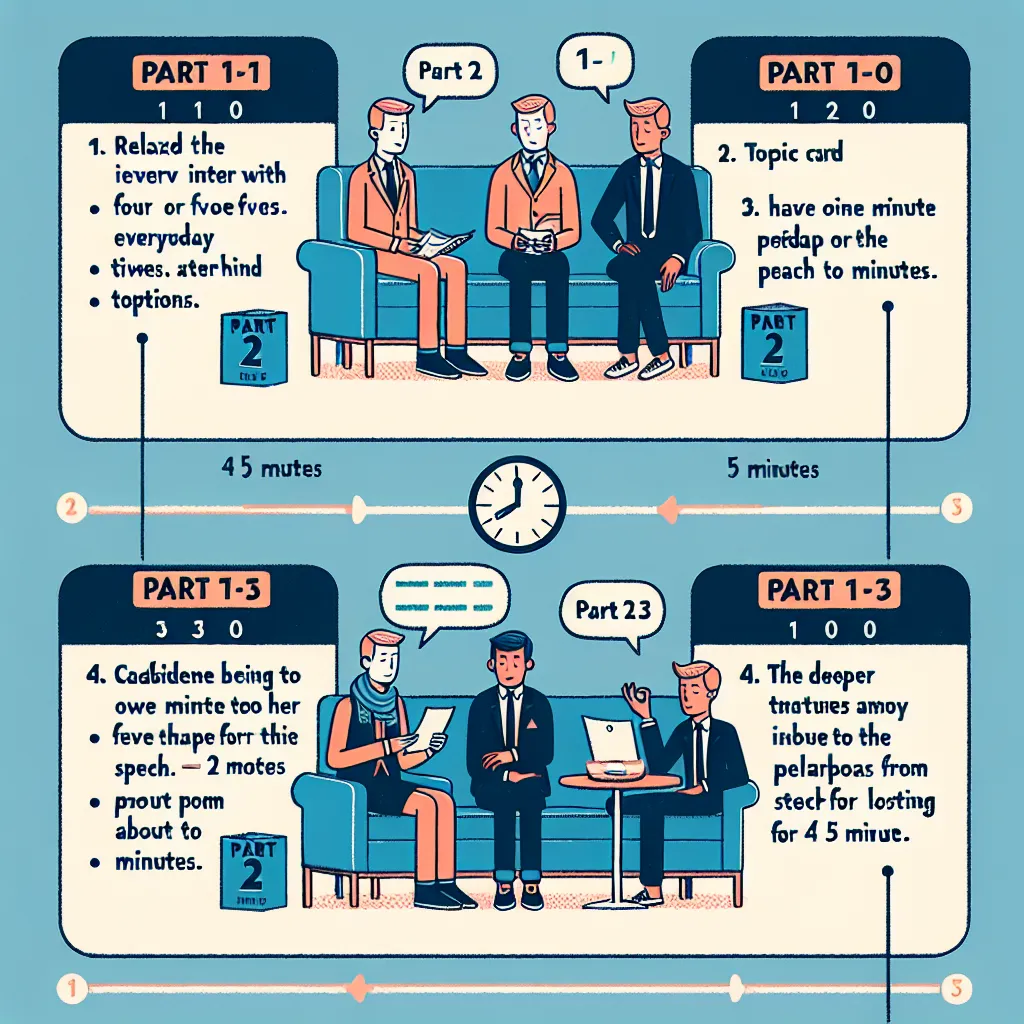The IELTS Speaking test is a crucial component of the overall IELTS exam, designed to assess your ability to communicate effectively in English. One of the key challenges that many test-takers face is managing their time effectively during this section. In this comprehensive guide, we’ll explore expert strategies and tips on how to manage time in the IELTS Speaking test, ensuring you can showcase your English language skills to their fullest potential.
Understanding the IELTS Speaking Test Structure
Before diving into time management strategies, it’s essential to understand the structure of the IELTS Speaking test. The test is divided into three parts:
- Part 1: Introduction and Interview (4-5 minutes)
- Part 2: Individual Long Turn (3-4 minutes)
- Part 3: Two-way Discussion (4-5 minutes)
Knowing this structure is the first step in effective time management, as each part requires a different approach.
 IELTS Speaking Test Structure
IELTS Speaking Test Structure
Strategies for Time Management in IELTS Speaking
1. Prepare Thoroughly
Preparation is key to managing your time effectively during the IELTS Speaking test. Here are some tips:
- Practice speaking English regularly, focusing on fluency and coherence.
- Familiarize yourself with common IELTS Speaking topics.
- Time yourself while practicing to get a feel for the duration of each part.
2. Listen Carefully to the Examiner
Paying close attention to the examiner’s questions and instructions can save you valuable time:
- Avoid asking for repetitions unless absolutely necessary.
- If you don’t understand a question, politely ask for clarification once.
3. Pace Yourself in Part 1
In the Introduction and Interview section:
- Keep your answers concise but informative.
- Aim for 2-3 sentences per question.
- Use time-saving phrases like “Well, I’d say…” or “In my opinion…” to give yourself a moment to think.
4. Master the One-minute Preparation in Part 2
For the Individual Long Turn:
- Use the full one minute to prepare your answer.
- Quickly jot down key points on the provided paper.
- Structure your response with an introduction, 2-3 main points, and a conclusion.
 IELTS Speaking Part 2 Preparation
IELTS Speaking Part 2 Preparation
5. Develop Your Answer in Part 2
When delivering your long turn:
- Speak for the full 1-2 minutes.
- Use your notes as a guide, but don’t read directly from them.
- If you finish early, elaborate on your points or add an example.
6. Stay Focused in Part 3
During the Two-way Discussion:
- Listen carefully to the examiner’s questions, which may become more complex.
- Take a brief moment to organize your thoughts before responding.
- Use linking words to structure your answers logically.
Common Time Management Pitfalls to Avoid
- Speaking too quickly: This can lead to mistakes and reduced clarity.
- Providing overly short answers: Particularly in Parts 2 and 3, this may result in follow-up questions and less control over the conversation.
- Going off-topic: Stay focused on the question to avoid wasting time.
- Overelaborating in Part 1: Remember, this section is meant for short, simple responses.
Advanced Time Management Techniques
1. Use Fillers Strategically
Employ fillers like “Well,” “Actually,” or “You know” to give yourself a moment to think without long pauses.
2. Practice the Art of Expansion
Learn to expand on your answers naturally:
- Provide examples from personal experience.
- Explain your reasoning behind opinions.
- Compare and contrast ideas when appropriate.
3. Develop a Mental Timer
Train yourself to have a sense of how long you’ve been speaking:
- Practice speaking for exactly one minute on various topics.
- Learn to gauge when you’re approaching the end of your allocated time.
4. Master Transition Techniques
Use smooth transitions between ideas to maintain a natural flow and pace:
- “Moreover,” “Furthermore,” “On the other hand” are useful transition phrases.
- Practice linking your ideas coherently to avoid abrupt stops or starts.
Preparing for the Unexpected
Even with excellent preparation, unexpected situations can arise. Here’s how to handle them:
- If you draw a blank, use a phrase like “Let me think about that for a moment” to buy time.
- If you finish a response too quickly, offer to elaborate or provide an example.
- If you’re unsure about a topic, relate it to something you do know and can discuss confidently.
 IELTS Speaking Unexpected Situations
IELTS Speaking Unexpected Situations
Conclusion: Mastering Time Management for IELTS Speaking Success
Effective time management in the IELTS Speaking test is a skill that can significantly improve your performance and, consequently, your score. By understanding the test structure, preparing thoroughly, and implementing the strategies outlined in this guide, you can approach the speaking test with confidence and showcase your English language abilities to their fullest potential.
Remember, practice is crucial. Regularly time yourself, record your practice sessions, and seek feedback from tutors or language exchange partners. With consistent effort and the right approach, you can master the art of time management in the IELTS Speaking test and achieve the score you desire.
We encourage you to share your experiences and any additional tips you may have in the comments below. For more IELTS preparation advice and resources, explore our other articles on IELTS.NET.
